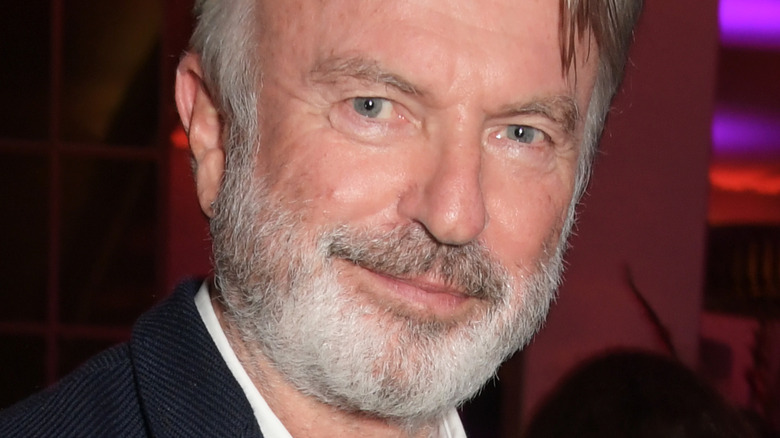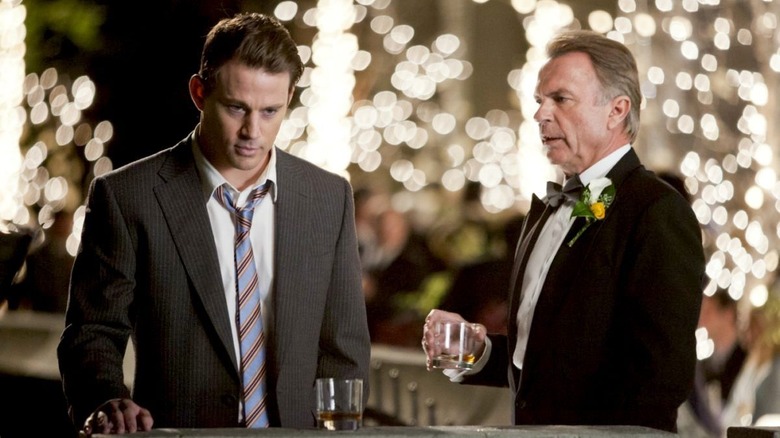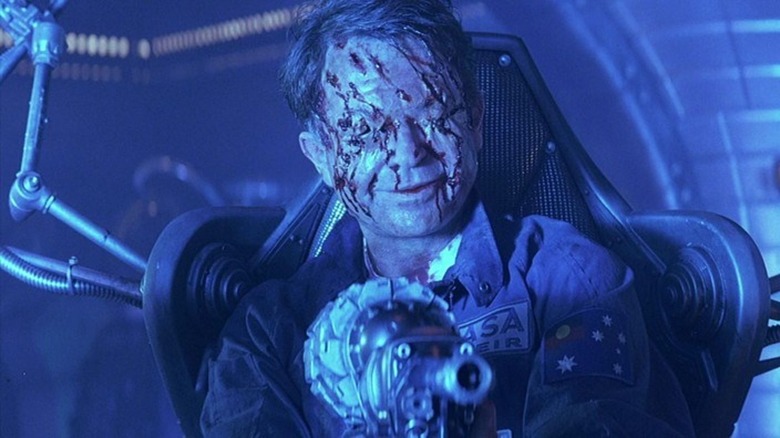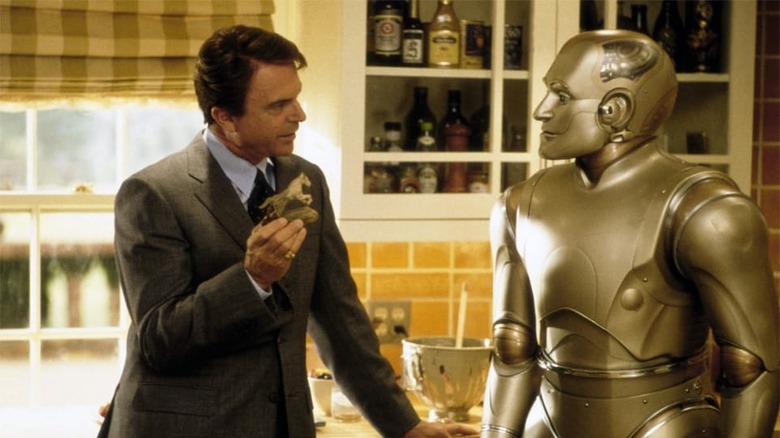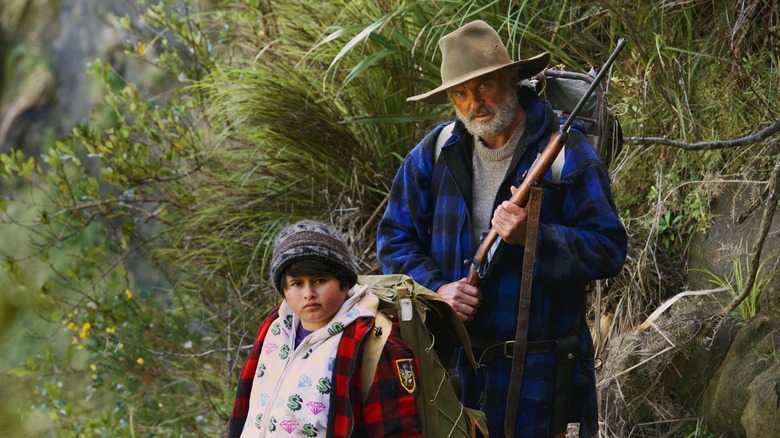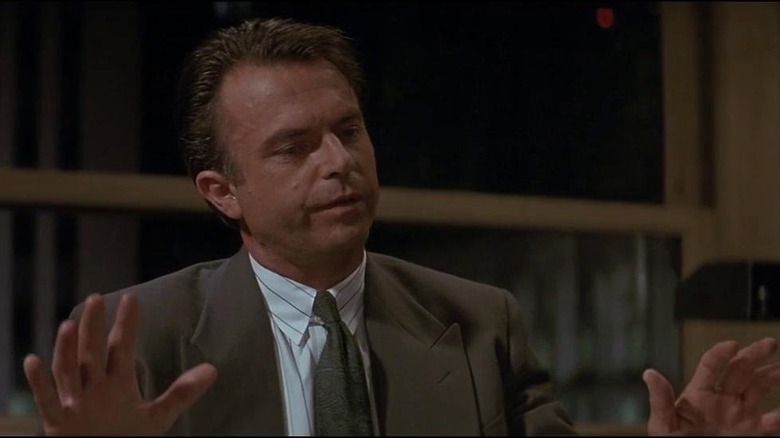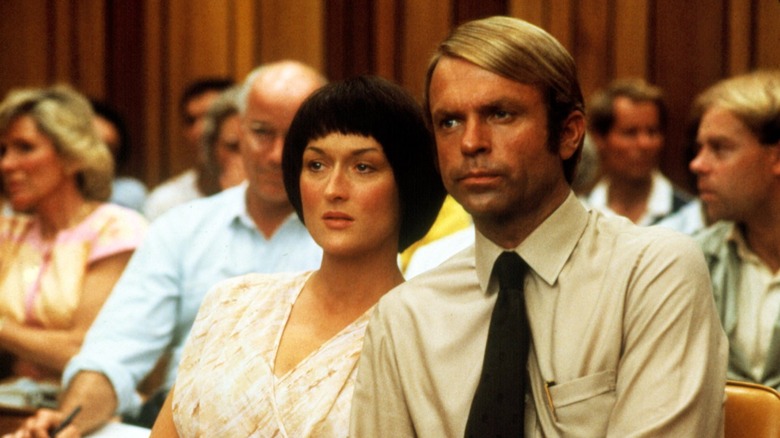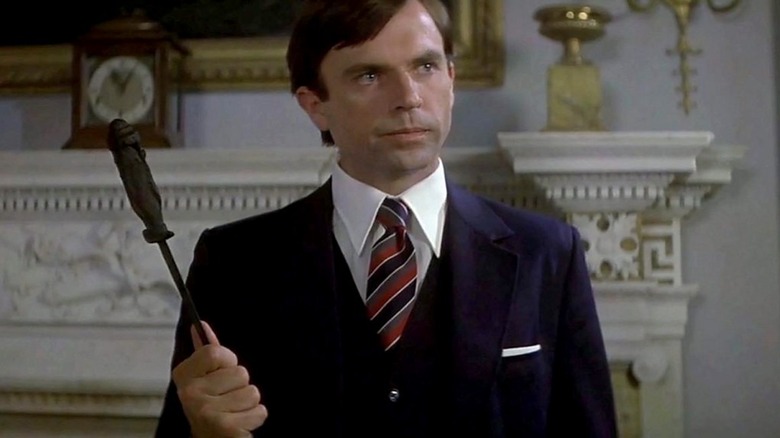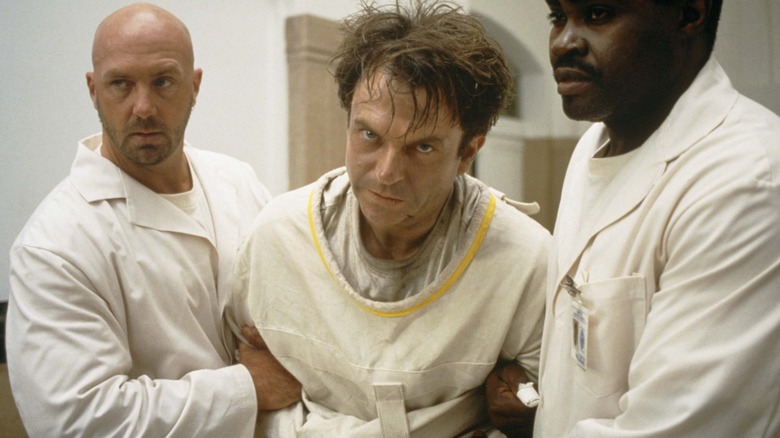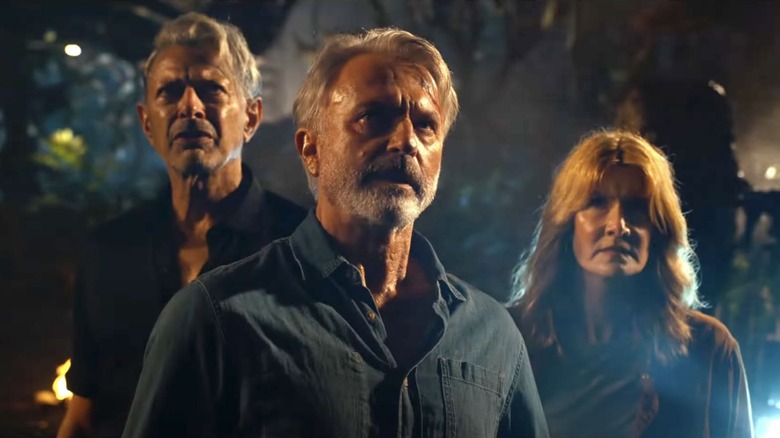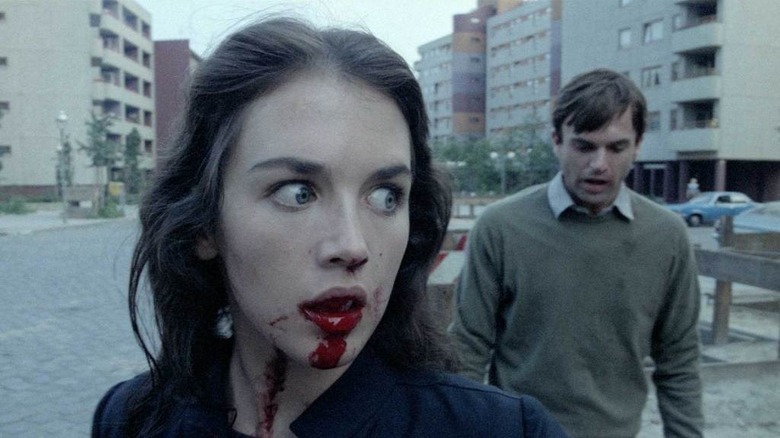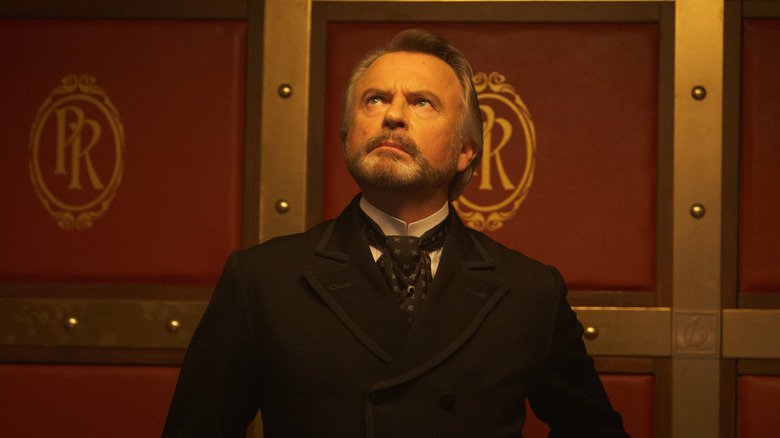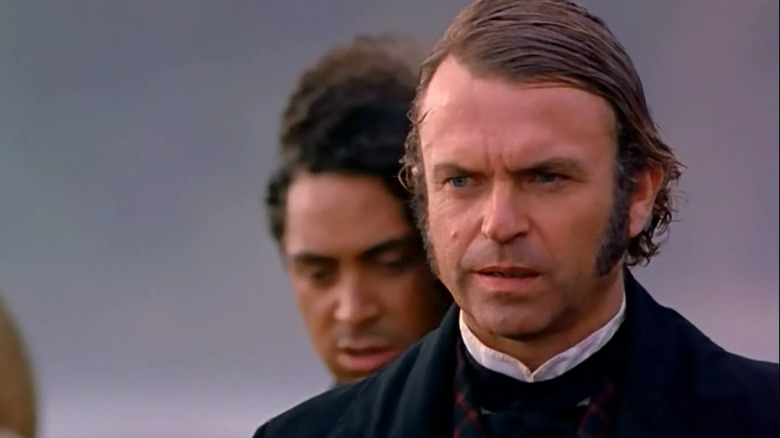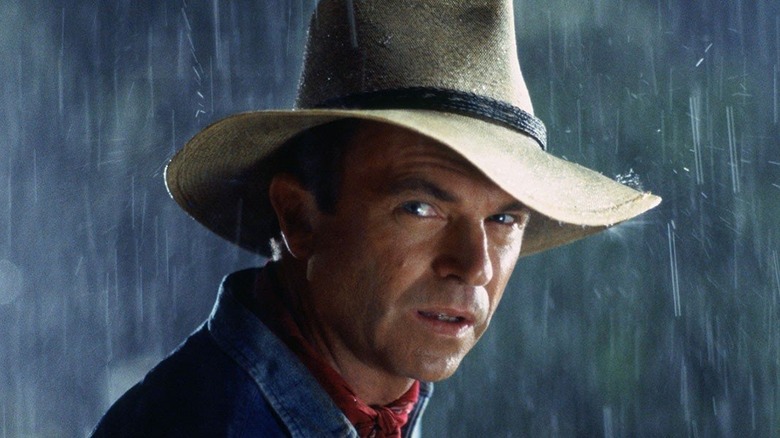Sam Neill's 7 Best And 7 Worst Movies Ranked
Whether it's in giant Hollywood blockbusters or intimate dramas filmed in his home country of New Zealand, Sam Neill has been a welcome presence on movie screens for decades. Although millions of fans remember him best as Dr. Alan Grant from "Jurassic Park," his filmography is much richer and more varied than just that Steven Spielberg dino-thriller (or the sequels "Jurassic Park III" and "Jurassic World: Dominion," in which he reprised the role).
Neill launched his career with the New Zealand thriller "Sleeping Dogs," quickly followed by the Australian drama "My Brilliant Career." Hollywood quickly came calling, and he was cast as the adult Damien Thorn in "Omen III: The Final Conflict." After that he bounced back and forth between international titles ("Possession," "A Cry in the Dark," "Dead Calm") and American fare ("The Hunt for Red October," "Memoirs of an Invisible Man").
His big breakthrough came in 1993, when he starred in both the year's highest grosser, "Jurassic Park," and one of its big Oscar players, Jane Campion's New Zealand-produced "The Piano." From there Neill landed roles in films as varied as "In the Mouth of Madness," "Event Horizon," "The Horse Whisperer," and "Bicentennial Man." He also became a steady presence on the small screen, perhaps most famously for his Emmy and Golden Globe-nominated performance as the titular wizard in "Merlin."
With a career as long and prolific as Neill's, it can be hard to narrow down a list of his best films (or even his worst). Let's take a look at Sam Neill's seven best and seven worst movies, ranked.
Worst: The Vow
In his two-and-a-half star review, Roger Ebert described 2012's "The Vow" as a "well-behaved, tenderhearted love story about impossibly nice people." Yet he found that Sam Neill's subtly manipulative performance added a little spice to what was essentially an otherwise bland date movie that plays it safe with tricky subject matter.
Loosely based on the true story of Kim and Krickitt Carpenter, "The Vow" casts Rachel McAdams and Channing Tatum as Paige and Leo Collin, young newlyweds whose happy union is interrupted by a car crash that leaves Paige in a coma. When she awakens, she has no memory of Leo or their marriage. Worse still, she thinks she still lives with her wealthy parents, Bill and Rita Thornton (Neill and Jessica Lange), and is engaged to her ex-fiancee, Jeremy (Scott Speedman). This is much to her parents' delight, since they've always liked Jeremy better than Leo. Yet in spite of these hurdles, Paige and Leo find a way to keep their marital vows.
Ebert's review was among the most generous the film received, and even he wasn't entirely sold on it. "It's all too painless," he wrote, adding that the film never really addresses the heartbreaking issues it brings up. Lisa Schwartzbaum of Entertainment Weekly was particularly vitriolic, declaring it "the kind of typically gooey, sub-Nicholas Sparksy romance that rolls into movie theaters each year around Valentine's Day, only to be hustled off the screen and forgotten as soon as February 14 has safely passed."
Best: Event Horizon
If you're going strictly off Rotten Tomatoes scores, "Event Horizon" belongs on a list of Sam Neill's worst films, not his best. Yet while it was critically maligned upon release, Paul W.S. Anderson's sci-fi horror flick has enjoyed a reevaluation in recent years, with fans clamoring for the long-lost director's cut. (The film was rushed through post-production, and Anderson was made to cut some of the more extreme sequences by the studio; according to the director, that footage is all but lost.)
Set in the year 2047, it stars Neill as Dr. William Weir, designer of the Event Horizon, a spacecraft that mysteriously disappeared and reappeared through a black hole. Weir and the crew of the Lewis and Clark, a rescue vessel led by Captain S.J. Miller (Laurence Fishburne), explore the ship in search of survivors. Yet they soon discover something sinister has come back with the ship — something that could threaten their own survival. As the crew starts getting picked off one by one, Dr. Weir begins acting very strangely, calling his true motives into question.
"Event Horizon" was a box office failure in addition to a critical one, grossing just $26 million on a $60 million budget. Yet it's gained a cult following, leading many reviewers to give it a second look. It's grown so popular, in fact, that a television adaptation went into development at Amazon in 2019. Who knows, perhaps that elusive director's cut will emerge from the black hole one day.
Worst: Bicentennial Man
As the 20th century came to a close and Y2K approached, more and more movies grappled with the implications of technology in our daily lives. Having learned the dangers of bringing dinosaurs back to life in "Jurassic Park," Sam Neill found out that owning your own robot isn't all it's cracked up to be in 1999's "Bicentennial Man."
Directed by Chris Columbus, it casts Neill as Richard Martin, who brings home a brand new NDR-114 robot to help out around the house. The android, known as Andrew (Robin Williams), takes a liking to the Martin family, especially "Little Miss" Amanda (played as a child by Hallie Eisenberg and as an adult by Embeth Davidtz). Andrew slowly begins to develop thoughts and feelings, and soon tries to buy his freedom from Mr. Martin, who angrily banishes him from their home. Years pass, and Andrew falls in love with Amanda's granddaughter, Portia (played again by Davidtz).
Hopes were high for the film, which was adapted from a short story by Isaac Asimov and a novel by Asimov and Robert Silverberg. But as Roger Ebert summed up, "'Bicentennial Man' begins with promise, proceeds in fits and starts, and finally sinks into a cornball drone of greeting-card sentiment." The majority of reviews were just as negative. Todd McCarthy of Variety called it "an ambitious tale handled in a dawdling, sentimental way." Despite its rotten reception, the movie did earn an Oscar nomination for its makeup, which transformed Williams into a living machine.
Best: Hunt for the Wilderpeople
Although he's best known for his Hollywood output, Sam Neill has a rich filmography abroad as well, particularly in his native New Zealand. He enjoyed one of his best roles in years in this Kiwi comedy, an early triumph from Taika Waititi.
Adapted from the book "Wild Pork and Watercress," "Hunt for the Wilderpeople" centers on young Ricky Baker (Julian Dennison), a juvenile delinquent who's taken in by his foster parents, Bella (Rima Te Wiata) and Hector (Neill), after his mother abandons him. When Bella dies, Ricky fakes his own death and makes a run for the woods, where he plans to live with his dog, Tupac. Hector tracks him down, but he breaks his ankle, stranding them in the wilderness. When the police show up, they conclude Hector has abducted Ricky, and the odd couple must work together to avoid capture.
The film earned near-universal praise from critics, who loved its tonal balance and performances. Dennis Harvey of Variety called it "a pleasing comedy-adventure that pays cheeky homage to key early works from [New Zealand's] first filmic renaissance — right down to casting the still-game Sam Neill." Stephanie Zacharek of Time wrote, "The cranky charisma of the performers, plus the cheerfully idiosyncratic rhythms of Waititi's filmmaking, keep it clicking."
Worst: Memoirs of an Invisible Man
Sam Neill starred in back-to-back films directed by horror master John Carpenter. One of their collaborations, "In the Mouth of Madness," is a highlight for both (more on that one later), while the other, 1992's "Memoirs of an Invisible Man," was a critical and commercial low point. Chevy Chase stars as Nick Halloway, a San Francisco stock analyst who suddenly turns invisible when a secret laboratory experiment goes horribly wrong. CIA operative David Jenkins (Neill) tries to track him down, which is easier said than done since he's now completely transparent. Halloway finds refuge (and romance) with Alice Monroe (Daryl Hannah), who helps him attain visibility again through makeup and sunglasses.
The film's development was notoriously rocky, as Oscar-winning screenwriter William Goldman ("Butch Cassidy and the Sundance Kid," "All the President's Men") left the project after feuding with Chase, who was also producing (Goldman was reported By the Los Angeles Times to have said, "I'm too old and too rich for this [fertilizer]"). He was quickly followed by director Ivan Reitman, who was replaced by Carpenter.
Although the finished product boasts impressive visual effects by Industrial Light and Magic, critics found fault with the film overall. "The true invisible man in this movie is director John Carpenter," wrote Jonathan Rosenbaum of The Chicago Reader, "a personal filmmaker in every sense of the word who is effectively silenced [by Chase]." He added, "Carpenter was apparently brought in as a hired gun to direct here, and the reduction in his usual effectiveness is palpable."
Best: A Cry in the Dark
Fairly or unfairly, 1988's "A Cry in the Dark" is best remembered as the movie where a dingo eats Meryl Streep's baby, immortalized by an early "Seinfeld" episode. Parody aside, both Streep and Sam Neill earned praise for their performances in this courtroom docudrama, which was released in Australia and New Zealand as "Evil Angels."
Directed by Fred Schepisi, it tells the true story of Lindy and Martin Chamberlain (Streep and Neill), an Australian couple whose infant daughter, Azaria, disappears while on vacation in the Australian outback. Lindy swears to have witnessed a dingo carrying their baby off in the night, but no one else can attest to this, and her icy demeanor — coupled with a mountain of circumstantial evidence — cause people to suspect she actually murdered her child. Prejudice against the couple's religious beliefs (Martin is a Seventh Day Adventist preacher) and media sensationalism only fuel public speculation.
Critics praised the film, which brought Streep one of her many Oscar nominations as best actress. Although it reminded him in some ways of a TV movie-of-the-week, Vincent Canby of The New York Times thought "A Cry in the Dark" was "better than that, mostly because of another stunning performance by Meryl Streep," while also praising Neill. Rita Kempley of The Washington Post agreed, writing that Neill was "quite good as a humble, bewildered sort who finally breaks under cross-examination."
Worst: Omen III: The Final Conflict
Sam Neill's international breakthrough got off to a shaky start with 1981's "Omen III: The Final Conflict." Having risen through the ranks of the New Zealand and Australian film industry (most notably starring opposite Judy Davis in "My Brilliant Career"), Neill landed his first plumb Hollywood role playing the world's most evil little boy, Damien Thorn, now all grown up and ready to boogey.
"The Final Conflict" finds a 30-ish Damien, aka the literal Antichrist, now in charge of his family's conglomerate and appointed to his father's former position as U.S. Ambassador to the United Kingdom. This is all part of Damien's plan to stop the Second Coming of Christ by killing every infant male born during a specific period. It's up to a cadre of priests, led by Father DeCarlo (Rossano Brazzi), to stop him from fulfilling his destiny.
While the first "Omen" was a critical and commercial success, the third entry put the final nail in the franchise's coffin. Critics scorned the film, which Roger Ebert called "a growing disappointment, as we realize that the apocalyptic confrontation between the forces of good and evil is being reduced to a bunch of guys with Italian accents running around trying to stab Damien in the back."
Best: In the Mouth of Madness
John Carpenter's "In the Mouth of Madness" was greeted with a lukewarm reception by critics and audiences when it was initially released. Yet it's been reappraised as one of Carpenter's best, thanks in large part to a frighteningly committed performance by Sam Neill.
Taking its inspiration from the works of H. P. Lovecraft, the 1995 film stars Neill as John Trent, an insurance investigator hired to track down horror novelist Sutter Cane (Jurgen Prochnow). Cane's work is hugely popular, and seems to drive everyone who reads it insane, so publisher Jackson Harglow (Charlton Heston) wants to get his hands on the manuscript for his next book. Trent and editor Linda Styles (Julie Carmen) track the writer down to a small New England town, which closely resembles the supernatural world of his novels. Before long, many strange and spooky things start happening, driving Trent and Styles into the very literal mouth of madness.
Jonathan Rosenbaum of The Chicago Reader was among the film's initial defenders, saying "'In the Mouth of Madness' isn't John Carpenter's best horror movie to date, but it may well be his scariest." Joey O'Bryan of The Austin Chronicle praised "Neill's performance, Carpenter's sense of mood, his smart use of the widescreen format — not to mention all the mutations, special effects, and the hilariously self-reflexive finale that diverts your attention."
Worst: Jurassic World: Dominion
Audiences turned out in droves to watch the original stars of "Jurassic Park" (Sam Neill, Laura Dern, and Jeff Goldblum) reprise their iconic roles for 2022's "Jurassic World: Dominion." Yet that nostalgia didn't extend to critics, who were eager to see director Colin Trevorrow's "Jurassic" trilogy finally go extinct.
Following the events of 2018's "Jurassic World: Fallen Kingdom," dinosaurs now roam the earth freely. Owen Grady (Chris Pratt) and Claire Dearing (Bryce Dallas Howard) are living off the grid with clone kid Maisie (Isabelle Sermon) and velociraptor Blue, who has miraculously given birth to a new dino-baby, Beta. Maisie and Beta are kidnapped, and Owen and Claire must track them down. Meanwhile, the same corporation that snatched Maisie and Beta, BioSyn, is set to disrupt the global food supply with genetically mutated locusts, leading Drs. Alan Grant (Neill), Ellie Sattler (Dern), and Ian Malcolm (Goldblum) to reunite.
Peter Debruge of Variety wrote, "Of the three 'Jurassic World' movies, 'Dominion' is the least silly and most entertaining. But that's not saying much." Added Bilge Ebiri of Vulture, "Watching 'Jurassic World: Dominion,' you might find yourself starting to feel just a little sorry for the people who made 'Jurassic World: Dominion.'"
Best: Possession
Although Isabelle Adjani won the Best Actress prize at Cannes, Andrzej Zulawski's "Possession" was largely ignored when in hit screens in 1981. Part of that had to do with how it was released: it was banned in the U.K. after being labeled one of the notorious "video nasties," and for years existed in the U.S. only in a heavily-edited version. Yet it's gained a massive cult following since then, thanks to a new restoration, and has become essential viewing for any Sam Neill fan.
Neill plays Mark, a spy who returns home to find his wife, Anna (Adjani), is having an affair and wants a divorce. After taking a beating from his wife's lover, Heinrich (Heinz Bennett), Mark hires a private detective to follow her around. But as Anna's behavior becomes increasingly violent and bizarre, it becomes clear something more sinister has taken hold of her.
Response was decidedly mixed upon its original release, perhaps because American critics were shown the 81-minute cut as opposed to the original 124-minute one. Yet contemporary critical and audience assessment has only grown stronger. Ben Sachs of The Chicago Reader flat-out declared it a masterpiece, while Peter Sobczynski of RogerEbert.com said the film "remains one of the most grueling, powerful, and overwhelmingly intense cinematic experiences that you are likely to have in your lifetime."
Worst: The Adventurer: The Curse of the Midas Box
Most Sam Neill fans have probably never heard of "The Adventurer: The Curse of the Midas Box," and for good reason. Initially envisioned as a franchise starter based on British author G.P. Taylor's "Mariah Mundi" book series, the 2013 film was a critical and commercial bomb that was barely released in theaters and disappeared shortly thereafter (needless to say, there was no Part 2).
Set in Victorian era-London, it stars Aneurin Barnard as Mariah Mundi, a young man who teams up with the mysterious Captain Will Charity (Michael Sheen) to rescue his kidnapped family. To do this, they must prevent the dastardly Otto Luger (Neill) from obtaining the Midas Box, an ancient artifact possessing mythical powers. The movie ends on a bit of a cliffhanger, as Mariah's family is still missing (revealed in a mid-credits scene to be in Egypt with the villainous Gormenberg — aka Mariah's father).
Although many critics were impressed by the film's production value, they were less enthused about its script and direction. Dennis Harvey of Variety called it a lackluster imitation of the "Harry Potter" movies, adding that it "should pass time tolerably for some of the same viewers until something more inspired comes along." Glenn Kenny of RogerEbert.com was more succinct, writing, "Meh and double meh on this movie."
Best: The Piano
The same year he became a Hollywood action star with "Jurassic Park," Sam Neill gave one of his best performances on his home turf of New Zealand in 1993's "The Piano." Although the lion's share of praise (and awards recognition) went to Holly Hunter and Anna Paquin, Neill is essential to the impact of Jane Campion's haunting, mesmerizing film.
He plays Alisdair Stewart, a frontiersman who has paid for his new wife, Ada McGrath (Hunter), and her daughter, Flora (Paquin), to travel from Scotland to his home in the woods of New Zealand. Ada, who has been mute for most of her life, only communicates through her piano, and feels no romantic warmth towards her new husband. Alisdair sells her instrument to George Baines (Harvey Keitel), a farmer who has taken up many customs of the local Maori tribes. He agrees to sell it back to Ada one key at a time in exchange for acts of intimacy. But when the two fall in love, it sends Alisdair into a tailspin of jealousy that leads to devastating consequences.
In his four-star review, Roger Ebert called the movie "as peculiar and haunting as any film I've seen." He praised the performances, writing that "Neill's taciturn husband conceals a universe of fear and sadness behind his clouded eyes." The film won near-universal raves from critics overall, and earned eight Oscar nominations, including Best Picture, while winning three: Hunter for Best Actress, Paquin for Best Supporting Actress, and Campion for Best Original Screenplay.
Worst: United Passions
When it comes to picking Sam Neill's worst movie, there's very little competition. A critical and commercial disaster of epic proportions, 2014's "United Passions" was principally bankrolled by FIFA (International Federation of Football Associates) and released at the height of that organization's corruption scandal. Labeled "a disaster" (via The Guardian) by its director, Frederic Auburtin, the film was roasted as propaganda and bombed at the box office, losing a reported $26.8 million.
The film recounts the formation of FIFA and its attempts to organize the first ever World Cup. Gerard Depardieu (who, according to the Guardian, demanded that Cannes president Thierry Fremaux screen it at the festival) is FIFA's third president, Jules Rimet; Neill is its seventh leader, Joao Havelange; and Tim Roth (who admitted to only appearing in the movie to help pay for his kids' college tuition) is his successor, Sepp Blatter, who was subsequently banned from participating in any FIFA events and will remain so until 2027.
Tim Appelo of The Wrap called it "one of those rare films so unfathomably ghastly you could write a better one sitting through its interminable 110 minutes," while Daniel M. Gold of The New York Times proclaimed it to be "one of the most unwatchable films in recent memory."
Best: Jurassic Park
For an entire generation of fans, Sam Neill will always be remembered as Dr. Alan Grant, the beleaguered paleontologist fighting back against genetically cloned dinosaurs in "Jurassic Park." Steven Spielberg's 1993 blockbuster was a game changer in visual effects, but it's the humans at the center that make it a classic.
Grant and Dr. Ellie Sattler (Laura Dern) are romantically-involved paleontologists who are invited by billionaire John Hammond (Sir. Richard Attenborough) to tour his revolutionary dinosaur theme park on a remote island. Along with mathematician Dr. Ian Malcolm (Jeff Goldblum), Grant and Sattler are amazed by the prehistoric creatures Hammond has miraculously brought back to life through DNA cloning. But their awe quickly turns to fear when the park malfunctions and the dinosaurs are let loose.
"Jurassic Park" topped the domestic box office for 1993, raking in over $338 million. It was also a critical darling and Oscar favorite, winning prizes for its visual effects, sound mixing, and sound effects editing (the same year Spielberg's "Schindler's List" took home seven awards, including Best Picture and Best Director). "The movie hasn't lost any of its charm in the 20 years since its release," wrote Bilge Ebiri of Vulture on the occasion of a 2013 3D reissue. "If anything, it's gained some, because those slick, seemingly perfect CGI dinosaurs now seem slightly more fake than they used to."
